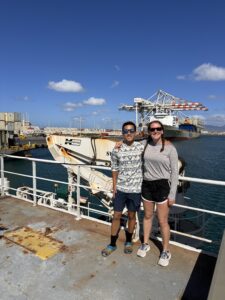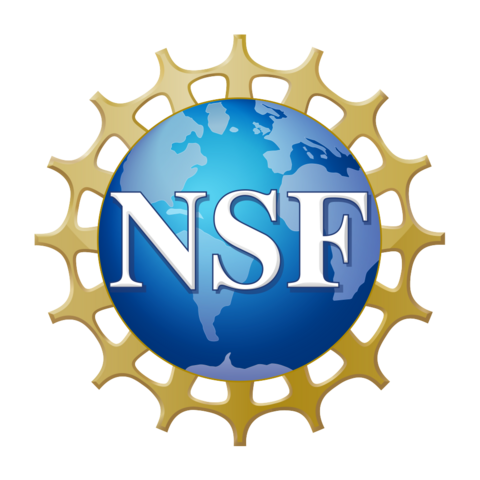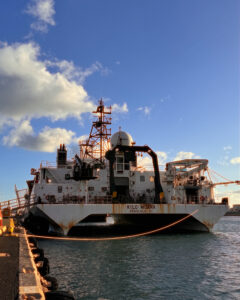
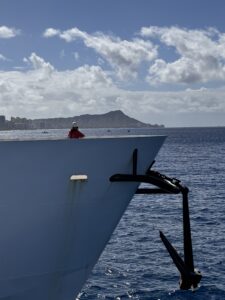
Two weeks ago, I was sitting in a conference room in Baltimore with 30 or so early career scientists where we divided up in groups and worked on projects to explore ocean data taken from a new NASA satellite, PACE. I left that workshop feeling inspired by how much each group could accomplish given just a couple hours over a couple of days. We overcame challenges more quickly than one individual could do alone. I’m having the same feeling now with the team aboard the R/V Kilo Moana, as we sail to our final locations off the Hawaiian Archipelago to observe and takes samples of the biology and chemistry below the ocean surface.
A majority of us on our team are early career scientists, ranging from graduate students to assistant professors. Many of us met each other for the first time just a few days ago in an auditorium at the University of Hawaii at Monoa, where the oceanography legend Dr. Dave Karl (co-founded the Hawaii Ocean Time-series and one of the first to see a hydrothermal vent) welcomed us with a quote by Roger Revelle ,”being a scientist and sailor is just too good to be true.” I couldn’t agree more.

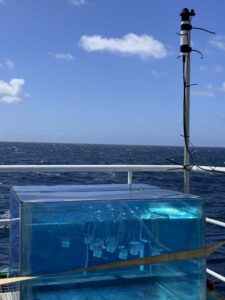
There are so many words I could use to describe why I like being an oceanographer and yet, not enough. Fascinating, engaging, fun, humbling, challenging, exhausting, serious, silly, stressful, meditative are all good adjectives, but one of my favorite ways to describe oceanography is that it is team driven. It’s not unlike a sports team preparing for their season. In the off-season, the team is built and practices around a game plan to understand how individuals work with one another and how they can prepare for their opponents as a cohesive unit. Our team’s offseason was a handful of Zoom discussions over the last two months in which we got acquainted with each other, became familiar with each other’s backgrounds and expertise, and then planned how we would approach the sea with just a few days together. Where would we go and why? What kind of samples and experiments did we want to take and do? What should our daily schedule look like? While a sports team has a whole season of games to try and make it to a championship game, we had only one game together. One shot. Straight to the Final. And hey I’ll tell you what, what a game it’s been!
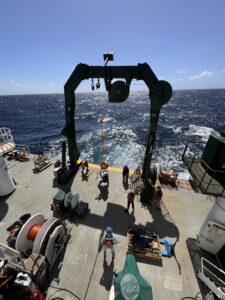
We all passed our COVID tests and no one was listed for injury reserve. No strained backs as we warmed up loading the ship with our gear and setting up instruments and space. Excitement and anticipation filled the air around the ship as the whistle blew for us to set sail and push towards the open sea. My early jitters and nervousness calmed as we eased into the groove of the game, taking one operation at a time. There has been a lot of individual effort, with everyone making plays to take the samples they need to push their own science forward. There have been a lot of assists to facilitate others: as brief as holding a door open, carrying bottles, lending materials, making an exploratory measurement, or setting aside a plate for someone who can’t make a meal; or more involved like stepping up to help in a collaborative incubation experiment. We’ve been great at executing our game plan, but of course, “no plan survives contact with reality.” Like any winning team, we’ve adjusted to challenges the sea has presented (much thanks to the fearless leadership of Dr. Angel White and Dr. Matt Church), particularly as it has thrown Hurricane Hone straight at us. It’s looking more like the high North Atlantic out here than the tropical Pacific! The hurricane has forced us into an opportunity to explore somewhere new and who knows what we’ll see. It’s not bad, just an adventure! The captain and crew have been an incredible supporting staff through it all. They’ve kept us safe, kept our field of play in ship shape, and have been attentive and gracious to our requests and needs.
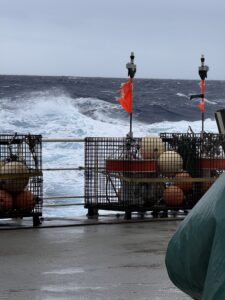

There’s still time on the clock, but sometimes we know how a game will end before the clock runs out. We were able to get out to the field and accomplish much of the science we planned to do, making the most of what we had. I think the win is sealed. I’ll call game. Each one of us is headed back home with logged data points and preserved sample sets as our medals. But I think the biggest trophy we can be proud of is the connection we made with each other as we played the beautiful game that is oceanography.
